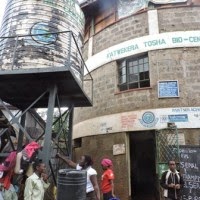The Importance of Multistakeholder Participation
Nairobi faces chronic water and sanitation service deficiencies due to rapid urbanization, population growth, inadequate infrastructure, and mismanagement of water resources. The imbalance between water supply and demand leads to erratic water distribution and frequent rationing, particularly affecting marginalized communities and informal settlements. In these areas, residents often rely on contaminated water sources like polluted rivers or shallow wells, increasing the prevalence of waterborne diseases such as cholera and typhoid. The city's sanitation infrastructure is inadequate, leading to impoverished areas' dependency on pit latrines that drain directly into waterways or storm drains. Such improper waste disposal degrades environmental and health standards. The unequal distribution of WASH services exacerbates existing social inequalities, as affluent areas receive more reliable water and sanitation access compared to low-income neighborhoods. This disparity underscores the urgent need for equitable policies and investments in water supply infrastructure and sanitation services.
In the development of such policies, all stakeholders must have a voice. Stakeholders in Nairobi include the government, non-governmental organizations (NGOs), private sector entities, community members, and development partners. Discussion between these entities is essential because each stakeholder brings unique expertise, resources, and perspectives to the table. By pooling together their strengths and capabilities, stakeholders can leverage synergies and maximize impact, leading to more sustainable and scalable solutions. Government agencies play a central role in setting policies, regulations, and standards, while NGOs often have grassroots connections and specialized knowledge in community development and advocacy. The private sector brings innovation, technology, and investment opportunities to the table, contributing to infrastructure development, service delivery, and job creation. Development partners, including international organizations and donors, can provide financial support, technical expertise, and global best practices to strengthen local initiatives and enhance sustainability.
Collaboration among these stakeholders fosters accountability, transparency, and inclusivity in decision-making processes, ensuring that the needs and priorities of all stakeholders, especially marginalized communities and vulnerable populations, are addressed effectively. Moreover, joint efforts facilitate knowledge sharing, learning from past experiences, and adapting strategies to evolving challenges such as climate change impacts on water resources and urban growth dynamics.
Umande Trust is one of multiple NGO stakeholders in Nairobi’s WASH environment. Beyond constructing bio centers and providing WASH education, Umande plays an active role in committees, group meetings, and forum discussions. Because of Umande’s many years of experience working to bring WASH to informal settlements, Umande provides unique insight and sanitation expertise during multistakeholder discussions. Umande advocates for proven community-specific sanitation solutions, like bio centers, and the needs of informal community members more broadly. On our podcast Voices4Change, we will be conducting a short interview series with various stakeholders to showcase the different perspectives each entity has on WASH within Nairobi. Look forward to these new episodes in the coming weeks!




I was devastated when I lost access to my crypto wallet containing $297,900 in USDT and Bitcoin. The panic and helplessness were overwhelming until I was referred to Morphohack Cyber Service. Their team of digital forensics and cyber recovery experts quickly stepped in, and to my amazement, they successfully traced and recovered every cent in my wallet.
ReplyDeleteThe entire recovery process took just 72 hours from the moment I first contacted them. Their professionalism, efficiency, and expertise were truly remarkable. I’m incredibly grateful for their help and want to highly recommend Morphohack to anyone facing similar issues with lost or compromised crypto wallets.
They’ve earned a reputation for being credible and reliable, and a quick search will show you that they’ve helped countless others in situations like mine. If you ever find yourself locked out of your crypto wallet or become a victim of crypto loss, don’t hesitate to reach out to them at [Morphohack@cyberservices. com].
Thank you, Morphohack, for your exceptional service!